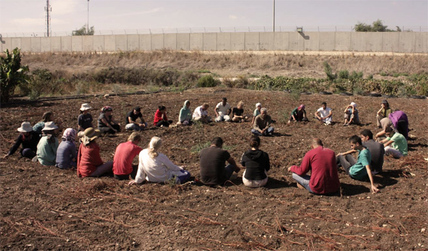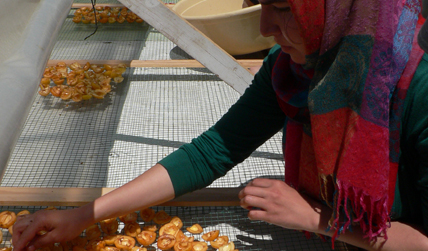The Global Campus Palestine has been based on the Taneeb family farm, Hakoritna (which loosely translates to ‘Garden Farm’), in the northern West Bank city of Tulkarm. The farm is bisected by Israel’s “Separation Barrier” – the concrete walls, barbed wire, military roads and ditches that run up and down occupied Palestinian territory; often separating Palestinian communities and families from each other or, as in this case, separating farmers from their land.
In 2005, Fayez Taneeb became active with the local Popular Committee Against the Wall and Settlements, and worked with a number of partners to coordinate a ‘Walk Along the Wall’’ for international peace activists. Many of those who attended came from the ‘peace village’ of Tamera, a ecological community and peace research project based in Portugal.
“That was when I started to hear about permaculture, and to realize its potential. From Tamera I received the message that water, food, and energy are available to all humanity if we work with the laws of nature,” Fayez told al-Araby al-Jadeed. “That’s a powerful resistance tool, because water, food and energy are things that Israel does not want us to control.”
Hakoritna Farm has been the host and venue for educational and network meetings, and continues to serve as a demonstration site for Permaculture food production and sustainable technological solutions. Currently this includes several forms of chemical-free raised-bed horticulture; solar food drying; biogas energy production; local seed collection, trading, and storage; and an innovative aquaponics installation.
In 2005, Fayez Taneeb became active with the local Popular Committee Against the Wall and Settlements, and worked with a number of partners to coordinate a ‘Walk Along the Wall’’ for international peace activists. Many of those who attended came from the ‘peace village’ of Tamera, a ecological community and peace research project based in Portugal.
“That was when I started to hear about permaculture, and to realize its potential. From Tamera I received the message that water, food, and energy are available to all humanity if we work with the laws of nature,” Fayez told al-Araby al-Jadeed. “That’s a powerful resistance tool, because water, food and energy are things that Israel does not want us to control.”
Hakoritna Farm has been the host and venue for educational and network meetings, and continues to serve as a demonstration site for Permaculture food production and sustainable technological solutions. Currently this includes several forms of chemical-free raised-bed horticulture; solar food drying; biogas energy production; local seed collection, trading, and storage; and an innovative aquaponics installation.
The Global Campus Palestine project has been building a network of partners, working towards the same goals all over Palestine. We are building a network of solidarity and support, and we are attracting many partners and projects.
There is power in connecting local communities with a large-scale network that shares common goals and aims. The Global Ecovillage Network (GEN) includes over 10 000 communities and projects; this includes traditional villages on the way to becoming more ecological and sustainable. One goal is to connect with the existing network of Palestinian projects, and together to build the first Palestinian ecovillage.
The GEN Palestine network will be the foundation, to then establish “GEN Sham,” a network within the countries of the Levant, to create manuals and study material in Arabic, including local knowledge and in connection with Arabic culture.
Some coming steps will be to offer an EDE (Ecovillage Design Education) course in Palestine in 2015; to hold a network gathering in Jordan in 2016; and to connect with the Permaculture Association. We are supporting the creating of a database of experts, and a “solution library” of skills and technologies.
The political situation in Palestine; with its walls, check points and barriers; does not allow easy connection among people, who are already busy with their economic survival. We see it as a great responsibility, to use our freedom and ability to connect people, to support the emergence of a strong regional network.
There is power in connecting local communities with a large-scale network that shares common goals and aims. The Global Ecovillage Network (GEN) includes over 10 000 communities and projects; this includes traditional villages on the way to becoming more ecological and sustainable. One goal is to connect with the existing network of Palestinian projects, and together to build the first Palestinian ecovillage.
The GEN Palestine network will be the foundation, to then establish “GEN Sham,” a network within the countries of the Levant, to create manuals and study material in Arabic, including local knowledge and in connection with Arabic culture.
Some coming steps will be to offer an EDE (Ecovillage Design Education) course in Palestine in 2015; to hold a network gathering in Jordan in 2016; and to connect with the Permaculture Association. We are supporting the creating of a database of experts, and a “solution library” of skills and technologies.
The political situation in Palestine; with its walls, check points and barriers; does not allow easy connection among people, who are already busy with their economic survival. We see it as a great responsibility, to use our freedom and ability to connect people, to support the emergence of a strong regional network.


